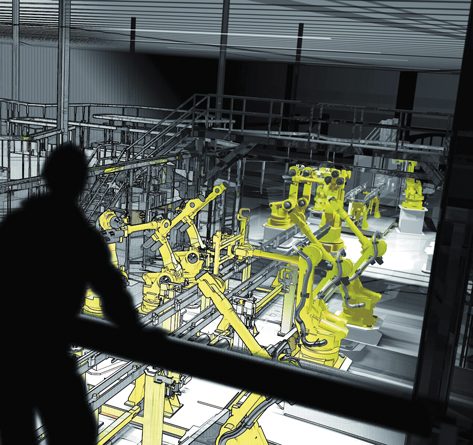Virtual Modeling of Manufacturing Operations with 3D Data
The “digital continuity” of data is the key to the evolution of manufacturing companies. If products have been designed and engineered fully in 3D, the manufacturing processes also can be modeled virtually. Powered by Dassault Systèmes’ 3DEXPERIENCE Platform, DELMIA solutions extend visualization beyond the product into manufacturing, providing the ability to simulate manufacturing processes before the physical plant or production line even exists.
Digital Manufacturing handles everything related to helping a manufacturer define the way to produce things. This layer exists between the engineers and the actual shop floor.
Because the product has been designed and engineered fully in 3D, the manufacturing processes also can be modeled virtually.
This is where the concept of digital continuity, or the digital thread, first showed its promise: using 3D design data all the way through to 3D manufacturing process models. Expertise delivered in this layer touches on ergonomics, flow simulations, machining, process planning, manufacturing management, robotics, and more.
Digital thread beyond the start of production
Virtual models of products are created before anything is manufactured. When those highly sophisticated models, encompassing massive amounts of data, are validated, a factory starts making the product. The challenge for the manufacturers of the future is to extend the digital thread beyond the start of production. Product and process models must integrate feedback from the shop floor, the from the supply chain, the distribution network, and even from consumers. Such data should be recycled back into those models to test them and improve them. This is an obvious extension of manufacturing’s focus on continuous improvement, now enabled by virtual experience modeling.
Managing manufacturing operations and implementing predictive maintenance
Manufacturing Operations Management (MOM) is the definition of what happens on a day-to-day basis during production. It connects all the people and machines on the shop floor and assigns them tasks and makes sure that the necessary parts or materials are in place. It is communicating “material requirements” back up the supply chain. It will, in the near-term future, use artificial intelligence in small but important ways. For example, manufacturing operations management efforts will look at all production data and use artificial intelligence to correlate that with the weather, the time of shift changes and other factors to pinpoint times and situations in which quality may suffer.
How to interpret and handle huge amounts of data
Another imminent application of artificial intelligence and operations management systems is the monitoring of the “health” of shop floor machines to determine when they need routine preventive maintenance. One of the biggest challenges facing companies with strong manufacturing operations management implementations is the explosion of data being generated by smart, sensor-connected machines and processes. With the rapidly interconnected shop floor via these new systems, manufacturers worldwide can measure and control their processes like never before. But the question is: how do you understand this rapid influx of data? This is where the complicated algorithms behind manufacturing systems software become critically important. Do they link all the different functions in the manufacturing process? Do they allow you to make major decisions or do they bog you down? Do they give you visibility or does the massive amount of data obscure a company’s critical issues? The ability to make sense of data is a key component of next generation manufacturing.
A software suite to promote production efficiency
Powered by Dassault Systèmes’ 3DEXPERIENCE Platform, DELMIA solutions help global businesses re-imagine their engineering, operations, and planning for manufacturing excellence.
The DELMIA suite drives manufacturing innovation and efficiency by planning, simulating, and modeling global production processes. DELMIA allows manufacturers to virtually experience their entire factory production from the impact of design to determining how to meet global demand. These simulation activities allow manufacturers to better address and shift processes so as to quickly respond to the competition, or to take advantage of new market opportunities. DELMIA Digital Manufacturing capabilities extend visualization beyond the product into manufacturing, providing the ability to simulate manufacturing processes before the physical plant or production line even exists. By proving out plant level considerations such as manufacturing approaches and material flow in the early stages of product development, the product concept can be analyzed to determine the best approach to make the product.
For continuous operations management, DELMIA Manufacturing Operations Management (MOM) solutions transform global production operations to achieve and sustain operational excellence. This is accomplished through digital continuity, a shared digital landscape connecting all stakeholders to improve visibility into, control over and synchronization across manufacturing operations and supply chain processes on a global scale. The result is improved agility and expanded continuous improvement across the enterprise and extended global supply chain. Manufacturers can establish a common set of operational processes that can be created, managed, and governed holistically on a global scale.

